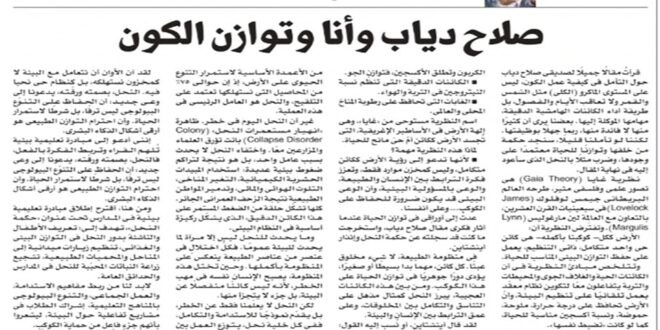Salah Diab, Myself, and the Balance of the Universe
By Hossam Badrawi
I read a beautiful article by my friend Salah Diab reflecting on how the universe functions—not on a macro level like the sun, moon, or the passing of days and seasons, but on the performance of small, seemingly marginal creatures carrying out the tasks assigned to them. Some of us may think many of these beings are useless, perhaps out of ignorance of their roles. But if we pause to reflect, we will find wisdom in their creation and in the life balance that depends on their existence. He gave an example of bees, which I will return to at the end of this article.
The Gaia Theory is a fascinating scientific and philosophical concept proposed by British scientist James Lovelock in the 1970s in collaboration with biologist Lynn Margulis. The theory suggests that:
Earth as a whole—our entire planet—is a single living, self-regulating organism that maintains the environmental balance necessary for life.
The theory’s core idea is that living organisms, the atmosphere, oceans, and soil interact to form a complex system that automatically regulates the environment. Earth maintains suitable temperatures, salinity, acidity, and oxygen levels, as if it “self-adjusts.”
The theory adds that living organisms do not merely exist in the environment—they actively contribute to its creation and regulation.
Real-world examples support this:
- Algae absorb carbon dioxide and release oxygen, balancing the atmosphere.
- Microorganisms regulate nitrogen levels in soil and air.
- Forests preserve the moisture of both local and global climates.
The name “Gaia” is inspired by the Greek goddess of Earth, who embodies Earth as a living, life-giving mother.
Why is this theory important?
Because it urges us to view Earth as an integrated organism, not just a warehouse of resources. It strengthens the idea of interconnection between humans and nature, promoting environmental awareness—an essential mindset for preserving both the planet and ourselves.
Salah Diab’s article stirred my thoughts and led me to revisit my notes on life’s balance, where I had previously recorded reflections on the wisdom of bees and Einstein’s warning.
In the grand scheme of nature, nothing is created in vain. Every creature, no matter how small or seemingly insignificant, plays a vital role in maintaining life’s balance on this planet. Among these wondrous beings, bees stand out as a remarkable example of harmony and integration among creatures and as a reflection of the deep interconnection between humans and the environment.
Einstein once said—or is attributed to have said:
“If the bee disappeared off the surface of the Earth, man would have no more than four years to live.”
While the attribution is debated, the statement conveys a scientifically accurate truth: bees are a cornerstone of biodiversity. Around 75% of the crops we consume depend on pollination, with bees being the main driver of this process.
Yet today, bees are under threat. The phenomenon known as Colony Collapse Disorder is deeply worrying to both scientists and farmers. Bee disappearance is not caused by a single factor but rather a buildup of environmental pressures: chemical pesticides, climate change, air and water pollution, and habitat destruction due to unchecked urban expansion—all of these create continuous stress on this tiny but critical creature that underpins our ecosystem.
What is happening to bees is a mirror of what is happening to the environment as a whole. Any imbalance in one element of nature reverberates through the entire system. When that system falters, humanity itself is in danger—for we are not separate from nature, but an inseparable part of it.
But bees don’t just warn us of danger; they also offer a model of sustainability and harmony. In every hive, roles are distributed between worker bees, drones, and the queen in a meticulous system that wastes no effort and squanders no resources. It’s a miniature ecosystem based on balance, cooperation, and respect for every being’s role.
It’s time we stop treating the environment as a storehouse to be consumed and instead embrace it as a living system we must coexist with. Bees, with their quiet presence and gentle nature, invite us into a new awareness: preserving biodiversity is not a luxury, but a prerequisite for life’s continuity. Respecting the natural balance is the highest form of human intelligence.
I call for an educational initiative that turns this idea into action—because bees, in their silence and grace, call us to a new consciousness: that protecting biodiversity is not optional, but essential. And that respecting natural balance is one of humanity’s greatest signs of wisdom.
Therefore, I propose launching an environmental education initiative in schools under the title “The Wisdom of Bees”, with the following goals:
- Teach children and youth about the role of bees in environmental and food balance.
- Organize field trips to apiaries and nature reserves.
- Encourage planting of bee-friendly plants in schoolyards and public parks.
We must integrate the concepts of sustainability, teamwork, and biodiversity into educational curricula. Let students participate in interactive environmental projects so they feel they are active agents in protecting the planet.
When we teach our children that a tiny bee can be a cornerstone for life itself, we plant in them a new awareness, a deep respect for nature, and a moral responsibility toward future generations.
 Dr. Hossam Badrawi Official Website
Dr. Hossam Badrawi Official Website


